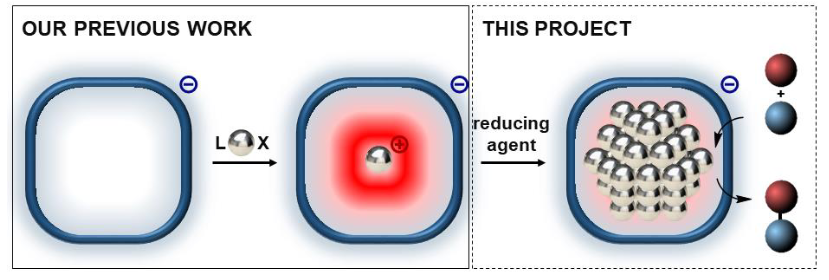CONFINING ULTRAFINE NANOPARTICLES IN SUPRAMOLECULAR CAGES
CHEMISTRY & GREEN CHEMISTRY

Lab: LHFA
Duration: NanoX master Internship (8 months part-time in-lab immersion)
Latest starting date: 02/01/2025
Localisation: Laboratoire Hétérochimie Fondamentale et Appliquée, (LHFA) 118, Route de Narbonne, 2R1
Building, 31062, Toulouse
Laboratoire de Physique et Chimie des Nano-Objets, (LPCNO) 135 Avenue de Rangueil, 31077,
Toulouse
Supervisors:
Gyorgy SZALOK gyorgy.szaloki@univ-tlse3.fr
Simon TRICARD tricard@insa-toulouse.fr
Work package:
CONTEXT: The properties of nanoparticles (NPs) depend strongly on their size and ultrasmall nanoparticles (u-NPs,
<3 nm)[1] have drawn considerable interest in recent years. Indeed, due to their quantum size behavior, they
possess unique properties, that differentiates them from larger NPs (10-100 nm). Although, controlled growth and
stabilization of u-NPs is challenging, recently a new strategy has emerged that takes advantage of confining u-NPs
in supramolecular cages.[2]
OBJECTIVES: Our experience within theLHFA has recently shown that cationic monometallic/dimetallic species can be encapsulated within the cavity of cyclotricatechylene (CTC) based anionic cages due to a favorable electrostatic interaction. The dimensions of these cages offer a unique opportunity to prepare
unprecedented u-NPs (or nanoclusters) with a size around 1 nm. Therefore, the aim of this internship project is to investigate u-NPs formation/stabilization within CTC cages.
RESEARCH PLAN: First, the CTC cages will be prepared based on a protocol developed in the LHFA. Then, the formation of u-NPs into the CTC cages will be studied via several different procedures (cage + metal complex + reducing agent). The results will be analyzed using microscopy (TEM, HR-TEM), spectroscopy (FT-IR and Raman)
and structural studies (PXRD, WAXS). Once the protocols optimized, the most interesting u-NPs will be further analyzed by complementary technics (DOSY-NMR, XPS) to confirm that u-NPs form exclusively within the cavity. Finally, their catalytic performance will be investigated in test reactions (CO oxidation, H2 evolution reaction, Suzuki
coupling) and compared to that of benchmark catalysts (Au/TiO2, Pd/C, Pt@PVP, Ni@3D graphene).
REQUIRED AND OFFERED SKILLS: We are looking for a motivated candidate with good synthetic skills. Good background in organic/organometallic chemistry and knowledge of basic analytical techniques (NMR, UV, MS) would be appreciated. On the other hand, the candidate will have the possibility to acquire skills in the preparation and characterization (TEM, XPS, DLS, PXRD, ICP-MS) of NPs. USEFUL INFROMATION: The internship will be carried out in two different laboratories (LHFA – synthetic work, LPCNO – NP characterization), both on the campus of the University of Toulouse. The two laboratories possess excellent facilities, they have high and complementary scientific expertise to carry out this joint project. The internship will be funded by the NanoX and will be further supported by the CONFICAT project (ANR-JCJC 2023)
CONTACT: If you are interested, send a 1-page CV, a motivational letter and your previous marks to:
Gyorgy SZALOKI (LHFA, +33 (0)5 61 55 77 41, gyorgy.szaloki@univ-tlse3.fr)
Simon TRICARD (LPCNO, +33 (0)5 67 04 88 33, tricard@insa-toulouse.fr)

References:
/
Areas of expertise:
Supramolecular Cages, nanoparticles, catalysis
Required skills for the internship:
We are looking for a motivated candidate with good synthetic skills. A good background in
organic/organometallic chemistry and the knowledge of basic analytical techniques (NMR, UV,
MS) would be appreciated.
